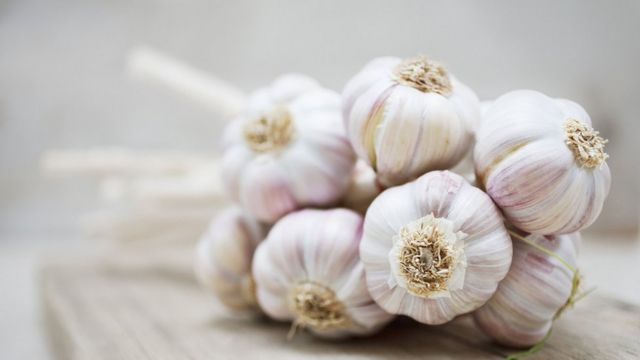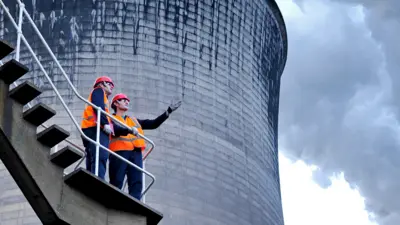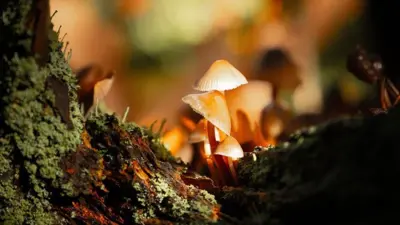We've updated our Privacy and Cookies Policy
We've made some important changes to our Privacy and Cookies Policy and we want you to know what this means for you and your data.
Chinese garlic is a national security risk, says US senator
美国参议员称中国大蒜构成国家安全风险
- By Theo Leggett 西奥·莱格特
- Business correspondent, BBC News
BBC 新闻商业记者

Image source, Getty Images 盖蒂图片社
The US imports about 500,000kg of garlic a year
美国每年进口约50万公斤大蒜
A US senator has called for a government investigation into the impact on national security of garlic imports from China.
一位美国参议员呼吁政府调查从中国进口大蒜对国家安全的影响。
Republican Senator Rick Scott has written to the commerce secretary, claiming Chinese garlic is unsafe, citing unsanitary production methods.
共和党参议员里克·斯科特已致信商务部长,声称中国大蒜不安全,生产方法不卫生。
China is the world's biggest exporter of fresh and chilled garlic and the US is a major consumer.
中国是世界上最大的新鲜和冷藏大蒜出口国,美国是主要消费国。
But the trade has been controversial for many years.
但多年来,这项交易一直备受争议。
The US has accused China of "dumping" garlic on to the market at below-cost price.
美国指责中国以低于成本的价格向市场“倾销”大蒜。
Since the mid-1990s it has levied heavy tariffs or taxes on Chinese imports in order to prevent US producers from being priced out of the market.
自20世纪90年代中期以来,它对中国进口商品征收高额关税或税收,以防止美国生产商因价格过高而被挤出市场。
In 2019, during the Trump administration, these tariffs were increased.
2019年,特朗普执政期间,这些关税有所提高。
In his letter Senator Scott refers to these existing concerns. But he goes on to highlight "a severe public health concern over the quality and safety of garlic grown in foreign countries - most notably, garlic grown in Communist China".
斯科特参议员在信中提到了这些现有的担忧。但他接着强调“对外国种植的大蒜的质量和安全存在严重的公共卫生担忧——尤其是在共产主义中国种植的大蒜”。
He refers to practices which, he says, have been "well documented" in online videos, cooking blogs and documentaries, including growing garlic in sewage.
他指的是在线视频、烹饪博客和纪录片中“详细记录”的做法,包括在污水中种植大蒜。
He has called for the Department of Commerce to take action, under a law which allows investigations into the impact of specific imports on the security of the US.
他呼吁商务部根据一项允许调查特定进口产品对美国安全影响的法律采取行动。
Senator Scott also goes into much detail about the different types of garlic that should be looked into: "All grades of garlic, whole or separated into cloves, whether or not peeled, chilled, fresh, frozen, provisionally preserved or packed in water or other neutral substance."
参议员斯科特还详细介绍了应该研究的不同类型的大蒜:“所有等级的大蒜,整个大蒜或分瓣的大蒜,无论是否去皮、冷藏、新鲜、冷冻、临时保存或包装在水或其他介质中中性物质。”
He argues: "Food safety and security is an existential emergency that poses grave threats to our national security, public health, and economic prosperity."
他认为:“食品安全和安保是一个事关生存的紧急情况,对我们的国家安全、公共卫生和经济繁荣构成严重威胁。”
The Office for Science and Society at McGill University in Quebec, which attempts to popularise and explain scientific issues, says there is "no evidence" that sewage is used as a fertiliser for growing garlic in China.
魁北克麦吉尔大学科学与社会办公室试图普及和解释科学问题,该办公室表示,“没有证据”表明中国使用污水作为种植大蒜的肥料。
"In any case, there is no problem with this," an article published by the university in 2017 says.
“无论如何,这没有问题,”该大学2017年发表的一篇文章称。
"Human waste is as effective a fertilizer as is animal waste. Spreading human sewage on fields that grow crops doesn't sound appealing, but it is safer than you might think."
“人类排泄物和动物排泄物一样是有效的肥料。将人类污水撒在种植农作物的田野上听起来并不吸引人,但它比你想象的更安全。”
Who, What, Why: Why do criminals smuggle garlic?
谁、什么、为什么:犯罪分子为什么走私大蒜?
Sweden has issued arrest warrants for two Britons suspected of smuggling garlic into the EU. Why would criminals do that?
Top Stories 热门故事
Features & Analysis 特点与分析
Most read 阅读最多的
Content is not available








